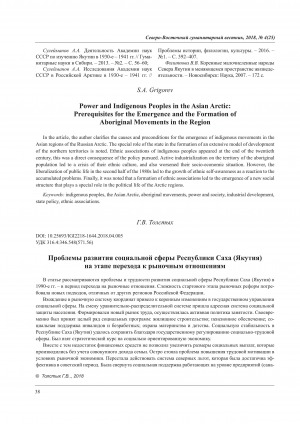Отраслевые подборки (УДК)
Издания подборки 1 - 1 из 1
Количество страниц: 6 с.
Подборки
- Общественные науки. Образование > Демография. Статистика. Социология,
- Общественные науки. Образование > Право. Юридические науки > Гражданское право. Судопроизводство,
- НАУКА ЯКУТИИ > ОБЩЕСТВЕННЫЕ НАУКИ > Демография. Статистика. Социология,
- НАУКА ЯКУТИИ > ОБЩЕСТВЕННЫЕ НАУКИ > Право. Юридические науки.
В статье рассматриваются проблемы и трудности развития социальной сферы Республики Саха (Якутия) в 1990-е гг. - в период перехода на рыночные отношения. Сложность стартового этапа рыночных реформ потребовала новых подходов, отличных от других регионов Российской Федерации. Вхождение в рыночную систему координат привело к коренным изменениям в государственном управлении социальной сферы. На смену уравнительно-распределительной системе пришла адресная система социальной зашиты населения. Формировался новый рынок труда, осуществлялась активная политика занятости. Своевременно был принят целый ряд социальных программ: жилищное строительство; пенсионное обеспечение; социальная поддержка инвалидов и безработных; охрана материнства и детства. Социальную стабильность в Республике Саха (Якутия) удалось сохранить благодаря государственному регулированию социально-трудовой сферы. Был взят стратегический курс на социально ориентированную экономику). Вместе с тем недостаток финансовых средств не позволил увеличить размеры социальных выплат, которые производились без учета совокупного дохода семьи. Остро стояла проблема повышения трудовой мотивации в условиях рыночной экономики. Перестала действовать система северных льгот, которая была достаточна эффективна в советский период. Была свернута социальная поддержка работающих на уровне предприятий (санатории, детские сады, летний отдых детей). Темпы структурной перестройки экономики, создание новых отраслей промышленности не совпадали по времени с осуществлением социальных реформ в обществе.
The article deals with the problems and difficulties of development of the social sphere of the Republic of Sakha (Yakutia) in the 90s - the period of transition to market relations. The complexity of the initial stage of market reforms required new approaches that differ from other regions of the Russian Federation. Entering the market system of coordinates led to fundamental changes in the state administration of the social sphere. The system of social protection of the population has replaced the equalizing and distributing system. new labor market was formed an active employment policy was implemented. A number of social programs adopted in a timely manner: housing construction, pensions, social support for the disabled and the unemployed, protection of motherhood and childhood. Social stability in the Republic of Sakha (Yakutia) maintained thanks to state regulation of the social and labor sphere. A strategic course was taken for a social-oriented economy. At the same time, the lack of financial resources did not allow increasing the amount of social payments that were made without taking into account the aggregate income of the family. There was an acute problem of increasing labor motivation in a market economy. The system of northern benefits ceased to operate, which was effective enough in the Soviet period. The social support of those working at the enterprise level (sanatoriums, kindergartens, summer rest for children) was minimized. The pace of economic restructuring, the creation of new industries did not coincide with the implementation of social reforms in society.
The article deals with the problems and difficulties of development of the social sphere of the Republic of Sakha (Yakutia) in the 90s - the period of transition to market relations. The complexity of the initial stage of market reforms required new approaches that differ from other regions of the Russian Federation. Entering the market system of coordinates led to fundamental changes in the state administration of the social sphere. The system of social protection of the population has replaced the equalizing and distributing system. new labor market was formed an active employment policy was implemented. A number of social programs adopted in a timely manner: housing construction, pensions, social support for the disabled and the unemployed, protection of motherhood and childhood. Social stability in the Republic of Sakha (Yakutia) maintained thanks to state regulation of the social and labor sphere. A strategic course was taken for a social-oriented economy. At the same time, the lack of financial resources did not allow increasing the amount of social payments that were made without taking into account the aggregate income of the family. There was an acute problem of increasing labor motivation in a market economy. The system of northern benefits ceased to operate, which was effective enough in the Soviet period. The social support of those working at the enterprise level (sanatoriums, kindergartens, summer rest for children) was minimized. The pace of economic restructuring, the creation of new industries did not coincide with the implementation of social reforms in society.
Толстых, Г. В. Проблемы развития социальной сферы Республики Саха (Якутия) на этапе перехода к рыночным отношениям / Г. В. Толстых // Северо-Восточный гуманитарный вестник. – 2018. – N 4 (25). – C. 38-43.
DOI: 10.25693/IGI-1644.2018.04.005
